The Income Tax Act requires books and records to be kept by every person, partnership, corporation, trust etc. who is required to pay or collect taxes or other amounts. Good financial records are essential for completing personal and corporate income tax returns. Without accurate records you and/or your business may under or over pay taxes or be subject to an audit by the Canada Revenue Agency (CRA) due to insufficient supporting documentation.
How long do you need to retain records for CRA?
The CRA indicates that you must keep all important business documents for six years from the end of the last taxation year they relate to. It is important to note that for a tax return that was filed late, the six year period begins the day the tax return was filed. To be safe, it is recommended to keep all supporting documentation for seven years to avoid any potential issues. Early destruction of business records may be allowed if written permission is received from the CRA. Early destruction without written permission may lead to prosecution. Please keep in mind that these are the CRA’s record retention requirements and other government agencies such as the Workers’ Compensation Board may have different requirements.
What does the CRA consider to be important business documents?
The CRA states that “you are required by law to keep records of all your transactions to support your income and expenses”. Your gross income must be supported by original documents that include the amount received, the date received, and the source of the income earned. Examples of income supporting documents include, but are not limited to, contracts, receipts, bank deposit slips and sales invoices. You should always obtain receipts when you purchase items for your business. The receipt should describe the goods and services you purchased, the date of purchase, the GST/HST paid, and the name and address of the seller or supplier. A note of caution, some documents only become important to the CRA more than six years after they were created. For example, the purchase agreement for an investment property should be retained until the property is sold, as the purchase information will be required to calculate the capital gain or loss on disposition. Documents such as minutes of director and shareholder meetings, share certificates and share transfer documentation must be kept for the life of the business plus two years. Please note that this list is not exhaustive. For more information visit Government of Canada.
For more information on this topic, please contact your McCay Duff advisor.
Contact Us




